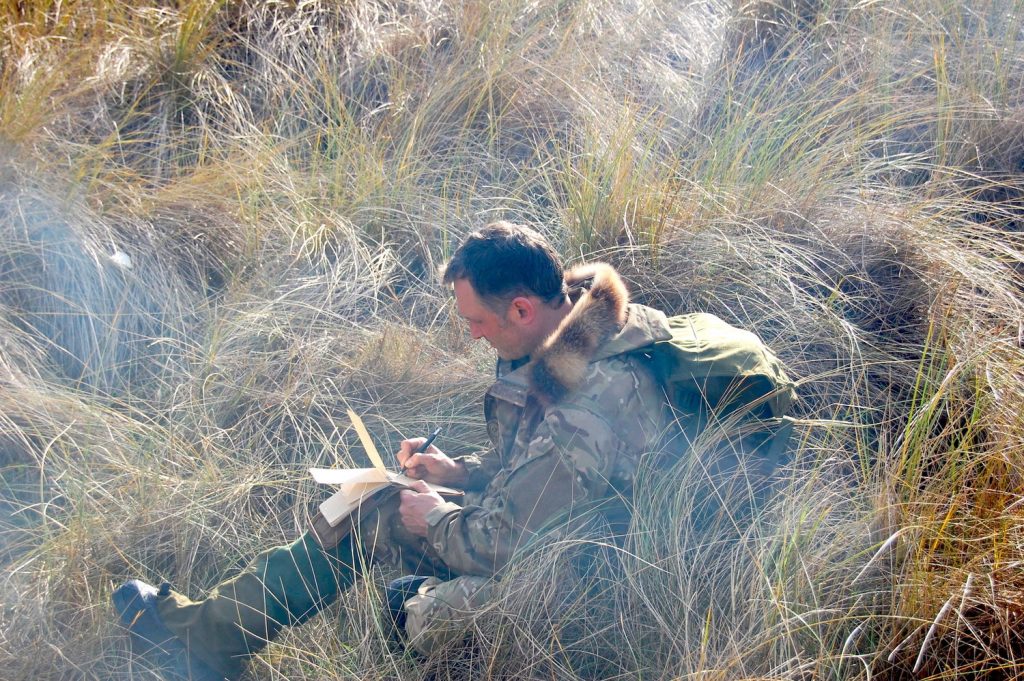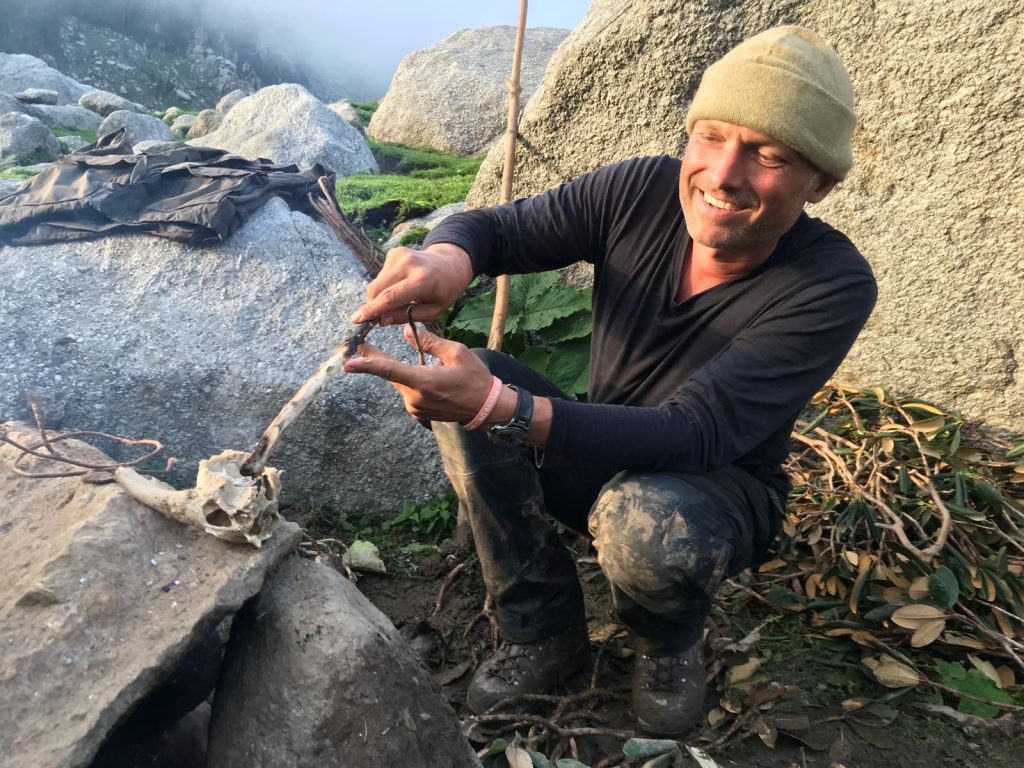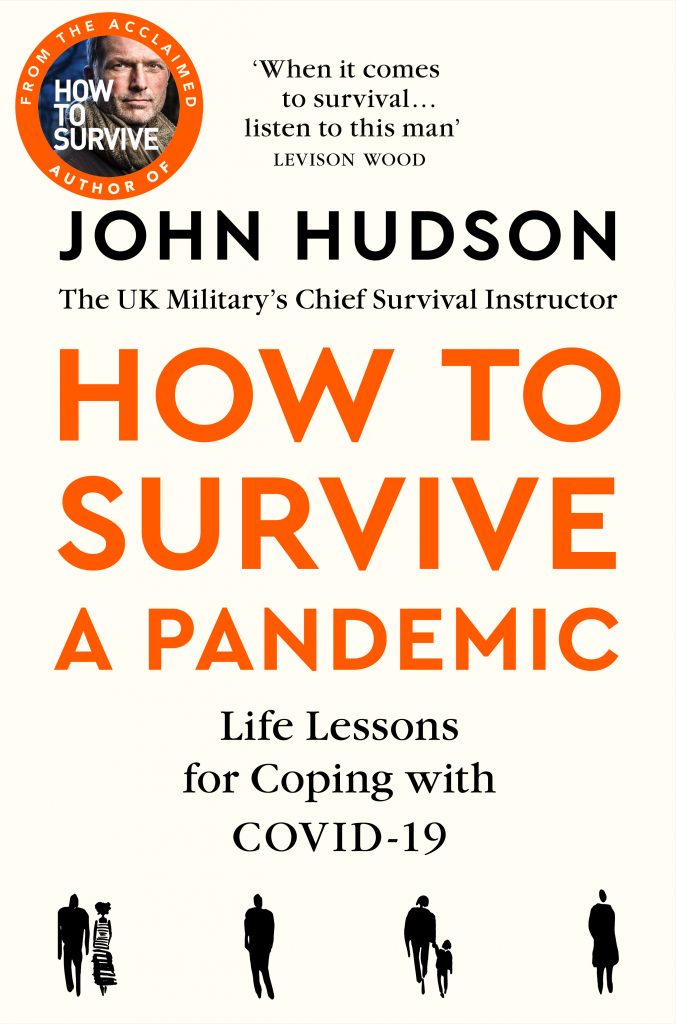
With most of the globe facing ongoing lockdown measures in response to the COVID-19 pandemic, we’re all in need a bit of help to guide us through these unprecedented times.
There’s certainly no shortage of information out there on the subject, but with the sheer volume of articles and videos doing the rounds, it’s sometimes hard to identify those simple, practical nuggets of knowledge that can make a real difference to our lives right now.
One man we trust more than most to dole out some much-needed wisdom is survival expert John Hudson. As the Chief Instructor to the British Military, he’s trained a whole host of people to stay safe and alive in difficult situations over the years.
Having just released a new free e-book, How To Survive A Pandemic, filled with seriously helpful info on the best ways to get through the Coronavirus crisis. We caught up with John to get some tips on isolating with friends and family, find out about the survival mindset and the essential items to keep close to hand.
The MALESTROM: Let’s begin by talking about the survival mindset – acceptance of the situation is a good first step for people to try and take…
John Hudson: I believe the survival mindset part to all this is specifically the stoic one where you’re in a position of great uncertainty and your surroundings are the only constant at the moment. But you’re in a world where you have to draw that line about what you can and can’t control.
If you can’t control some of it, like what’s happening in the wider world around you, then there’s no point scrolling through that bottomless social media feed or watching the news all day as it will make you fearful and it’s going to drag you down.
It’s that fear of future anxiety. If you want to know what’s happening make sure you choose the right information sources. This is very much like military survival stuff, you don’t listen to rumours, you have communications windows you adhere to and you get really succinct bullet point updates about what to do next if you’re sneaking around in enemy territory.
So choose your news sources really prudently. Personally I’ve been looking towards the World Health Organisation and if I need something a little more detailed I won’t just Google it, I’ll look to something like The New Scientist, that has a bit more background data in it. But I only do it twice a day, cause in between you just end up sucked into the same scrolling update of mortality rates.
That’s one part of the mindset, knowing what you can control and what you can’t. If there’s something you can’t control, and you want to monitor it to be situationally aware then that’s that part of it and the other bits you can control are about your outlook and personal space. There are some easy structures for your personal life that are really beneficial.
There are some brilliant examples that I mention in my free e-book of people who are really used to this kind of scenario where they can’t just nip out for a coffee because they’re on the International Space Station or in the past they were in charge of a lighthouse. They get around it by having a really structured day.
It’s really important to have a timetable, you don’t have to stick to it meticulously but keep that structure. So eat at a set time each day, that gives you the right sleep rhythms, so you’re not eating really late and staying up watching crap telly and getting to a place where your routine is sliding. Keep a structure.
The other thing that psychologists have found, like John Leech, who studied people who’ve been in really bad lockdown situations, tragic ones like Auschwitz.
One of the things that is a determinant of whether people are coping or not, is that people stop looking after things like personal hygiene. So it’s important that you get up on time, have a wash, crack on with your day and don’t let the crap accumulate around you, keep on top of all that.
Obviously that’s not just important for you personally, but when you look at these small teams we get within an isolated household, that’s very similar to lighthouse keepers in the past.
It’s important you not only look after yourself but also, that your not the person that winds everyone else up. It’s vital in these confined scenarios. Don’t be that guy. Make sure you pick up your socks, wash up, put your dishes away, do these things otherwise there will be friction. There’s going to be friction regardless, but do what you can to minimise it.

TM: We’ve talked before about the importance of keeping your spirits up in survival situations. Adventurers we’ve spoken to often choose their team based as much on who they’d be like to spend extended periods of time with as much as their skills. Obviously we don’t have that kind of luxury in this situation. Are there specific techniques for coping with different personalities?
JH: There are some subtle techniques. The best one I’ve come across is a little mantra. There are a couple I’ve worked with before and on the wall of their tent they’ve written in permanent marker,
“Only Say Nice Things To Each Other”
Someone sent me a picture on social media and they’d written it on their living room wall. So that’s one good rule of thumb because it’s really easy to just snap back and say something you’ll regret. Another one, if you’ve had a fight with your loved ones, then don’t inhabit the same space for the next quarter of an hour, go to a different room. There’s no point going over it, things tend to be better in fifteen minutes.
Part of this isolation is going to be familiar territory to those that have done Polar missions and gone to space, they all acknowledge you need some alone time. Even if you’re in a small confined space, you need somewhere within that space where you’re not going to be bothered and interrupted. You can have too much of other people’s thoughts, so a bit of personal time is healthy.
TM: Last time we spoke we went through PLAN – Protection, Location, Acquisition, Navigation. Is that still relevant during this crisis?
JH: It is I think. It also applies to what happens next. It’s going to potentially make people look ahead more and be less reactive. The worst early symptom of what has gone on was all the panic buying of things like toilet paper, which was just bonkers. For the future, make sure you’ve got enough of the stuff that you need should something like this happen.
Put it somewhere you can access it twice a year, and I’m not talking about prepping and digging bunkers, I mean keep a small supply of tins, anything you would normally eat and anything that’s got a long shelf life and isn’t going to be attractive to pests, put all that somewhere safe.
That alleviates the personal anxiety if you see other people panic buying you can think that you’re alright and can wait until things die down and top up as normal. That’s the acquisition part of PLAN that you can park for later.
With location, when we’re doing military survival, if you’re not in an overt situation, location just becomes communication with rescue forces.
We’ve touched on that with choosing your news sources accurately, so make sure you’ve got a good source of info and for future reference, if stuff does go belly up and you need a way to access that if streaming services die, check that your telly can still hit the antennas and if the worst case happens, check that you can tune your car radio to FM rather than digital, those sorts of things.
The protection part is really key this is the foundation of everything we’re talking about. When it comes to social distancing and not being a dick by going out all the time, it’s really important to understand what your vulnerabilities are. This is directly equivalent to military survival.
In the last four weeks we’ve all learned loads about the virus and how it transmits and yet there are still people who are out there who still aren’t doing important things like covering their mouths when they cough, that’s going to make that a massive social taboo again, which is good.
So know your vulnerabilities, that hand to face is a good way for the virus to be transmitted into the body. You can’t definitely stop yourself doing that, which embeds the best behaviour, which is to wash your hands regularly. Know you can’t inhibit all those involuntary actions all the time, but make sure when you do it, it’s less of a risk.
And when you do go out, don’t encroach in personal spaces and don’t go to places where there are concentrations of people and activity, if you can just stay in your house. It’s not a hard ask, is it? Stay at home and finish off all the DIY jobs you’ve needed to get done.

TM: Going back to the acquisition part quickly, are there any other items you’d advocate keeping handy? I know you’ve previously mentioned a first aid kit.
JH: That’s always a good one mate. The one people don’t always think about, because we live in such a comfortable society, is what would happen if the lights went out and the water supply was temporarily off?
You can boil water, which everyone knows is a great way to purify it, but if the electricity is out you’re going to struggle putting the kettle on. So have a part-time fix in case there’s a disruption in the future.
Purification tablets are chlorine-based tablets that will make one-litre of clear water that’s virus and bacteria-free. That’s your easiest answer and it’s what we advocate to those that can’t light fires when they’re evading. Simple to use and almost impossible to get wrong.
TM: Another uncertainty we have at this time is how long this pandemic is going to go on for. Is it best to take a day-by-day approach or would you advise something different?
JH: It’s a tricky one. Personally, I’ve got different timeframes for different tasks. I’m looking at a week or two weeks in terms of supplies for the house. With anything like that I’m not going to get a massive trolley full as it isn’t fair on everyone else.
I’m going to keep to the same pattern of how things were before, albeit one big shop rather than lots of little runs to the shop to minimise the time I’m out. If I can do Click & Collect I will, but I won’t hog those spots as there are people who need those slots more than me.
With other tasks, I’ll do my laptop work stuff in the morning, have a break for lunch and then in the afternoon I’ll leave some time to do something totally distracting. There’s a really interesting social study that was done a while ago which found out the best thing to do to lower your stress is just to read a book. It’s 300% better than going out for a walk and 700% better than online gaming.
TM: Stress is obviously dangerous to health and the immune system – so especially with COVID-19 we need to try and give ourselves the best chance not to feel that way…
JH: Even though most of us are just sat in our houses, notwithstanding the people who are actually doing the hard job in the NHS on the frontline, it’s important as you say to keep healthy and one of the best ways we can do this is by reducing anxiety and stress. One of the key things is to get enough rest and not to work every day, keep your weekends. Make sure you leave a day to properly chill out.
TM: And you still advocate drinking tea for reducing stress?
JH: Obviously mate. I’m Northern!
Download John’s new free e-book, How to Survive a Pandemic, here: https://www.johnhudsonsurvival.com/field-notes
And make sure you get yourself a copy of the brilliant, How To Survive: Lessons for Everyday Life from the Extreme World
Click the banner to share on Facebook



